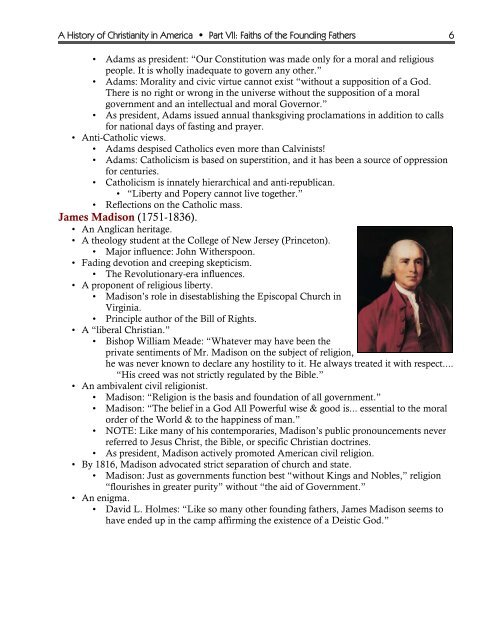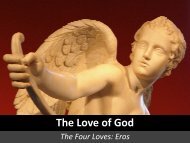7 Faiths of the Founding Fathers - Perimeter Church
7 Faiths of the Founding Fathers - Perimeter Church
7 Faiths of the Founding Fathers - Perimeter Church
You also want an ePaper? Increase the reach of your titles
YUMPU automatically turns print PDFs into web optimized ePapers that Google loves.
A History <strong>of</strong> Christianity in America • Part VII: <strong>Faiths</strong> <strong>of</strong> <strong>the</strong> <strong>Founding</strong> Fa<strong>the</strong>rs 6• Adams as president: “Our Constitution was made only for a moral and religiouspeople. It is wholly inadequate to govern any o<strong>the</strong>r.”• Adams: Morality and civic virtue cannot exist “without a supposition <strong>of</strong> a God.There is no right or wrong in <strong>the</strong> universe without <strong>the</strong> supposition <strong>of</strong> a moralgovernment and an intellectual and moral Governor.”• As president, Adams issued annual thanksgiving proclamations in addition to callsfor national days <strong>of</strong> fasting and prayer.• Anti-Catholic views.• Adams despised Catholics even more than Calvinists!• Adams: Catholicism is based on superstition, and it has been a source <strong>of</strong> oppressionfor centuries.• Catholicism is innately hierarchical and anti-republican.• “Liberty and Popery cannot live toge<strong>the</strong>r.”• Reflections on <strong>the</strong> Catholic mass.James Madison (1751-1836).• An Anglican heritage.• A <strong>the</strong>ology student at <strong>the</strong> College <strong>of</strong> New Jersey (Princeton).• Major influence: John Wi<strong>the</strong>rspoon.• Fading devotion and creeping skepticism.• The Revolutionary-era influences.• A proponent <strong>of</strong> religious liberty.• Madison’s role in disestablishing <strong>the</strong> Episcopal <strong>Church</strong> inVirginia.• Principle author <strong>of</strong> <strong>the</strong> Bill <strong>of</strong> Rights.• A “liberal Christian.”• Bishop William Meade: “Whatever may have been <strong>the</strong>private sentiments <strong>of</strong> Mr. Madison on <strong>the</strong> subject <strong>of</strong> religion,he was never known to declare any hostility to it. He always treated it with respect....“His creed was not strictly regulated by <strong>the</strong> Bible.”• An ambivalent civil religionist.• Madison: “Religion is <strong>the</strong> basis and foundation <strong>of</strong> all government.”• Madison: “The belief in a God All Powerful wise & good is... essential to <strong>the</strong> moralorder <strong>of</strong> <strong>the</strong> World & to <strong>the</strong> happiness <strong>of</strong> man.”• NOTE: Like many <strong>of</strong> his contemporaries, Madison’s public pronouncements neverreferred to Jesus Christ, <strong>the</strong> Bible, or specific Christian doctrines.• As president, Madison actively promoted American civil religion.• By 1816, Madison advocated strict separation <strong>of</strong> church and state.• Madison: Just as governments function best “without Kings and Nobles,” religion“flourishes in greater purity” without “<strong>the</strong> aid <strong>of</strong> Government.”• An enigma.• David L. Holmes: “Like so many o<strong>the</strong>r founding fa<strong>the</strong>rs, James Madison seems tohave ended up in <strong>the</strong> camp affirming <strong>the</strong> existence <strong>of</strong> a Deistic God.”



